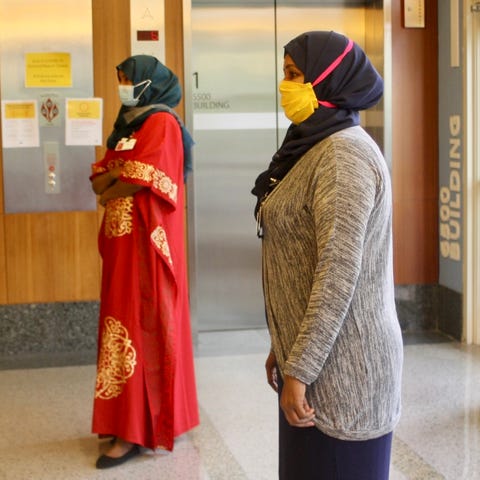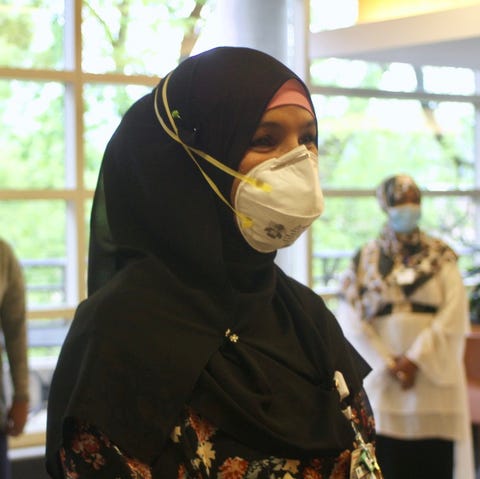Products You May Like
When Hilal Ibrahim found out that Muslim healthcare workers were throwing away their hijabs in between shifts for infection control purposes, she set out to design a sanitary head scarf that could be easily washed and safely reused.
The Minnesota fashion designer and owner of Henna & Hijabs, a boutique specializing in organic henna and handcrafted hijabs, has donated over 700 hijabs to COVID-19 doctors and nurses all over the state. They come in a variety of neutral colors—including black, tan, blue, and blush pink—and were designed at a length that adheres to religious needs.
“Most importantly, they don’t impact mobility on the job and stay securely in place,” Ibrahim tells ELLE.com. “That’s critical, given [that healthcare workers] need to be so mindful of hand to face contact, especially in those environments.”
The hospital-grade hijabs are flexible enough for both patients and employees to wear. Each covering is hand-cut and hand-stitched with fabric that’s ethically made. They’re also designed to withstand industrial washing machines.
In light of COVID-19, Ibrahim’s tailors have added extra steps to the manufacturing process. Everyone wears gloves and masks when handling the hijabs and takes extra caution to help mitigate the spread of germs when packaging them.
“Women need to be confident that what they’re placing on their heads is clean and doesn’t need to be rationed or reused in the same way a masks or a face shield is,” says Ibrahim. “More importantly they shouldn’t have to bring their hijabs back and forth to their homes, which could potentially expose their families or others to anything they came into contact with at the hospital.”
Ibrahim communicates with Minnesota hospitals—including Health Partners, Park Nicollet, Hennepin Health, Allina Health, University of Minnesota Health, and the Mayo Clinic—to come up with a safe drop-off plan before delivering the hijabs.
She says in the last few weeks, Henna & Hijabs has been inundated with hijab requests from healthcare employees all over the country.
“A sanitary hijab in a healthcare settings is critical for infection control, and is often considered unessential due to the lack of familiarity with the standard religious head covering of Muslim women,” Ibrahim says. “This virus just further exposing the disparities and struggles some groups face in this country… I hope we can move toward a better understanding and breakdown some of the barriers non-Muslim folks have around hijabs.”
This content is created and maintained by a third party, and imported onto this page to help users provide their email addresses. You may be able to find more information about this and similar content at piano.io


